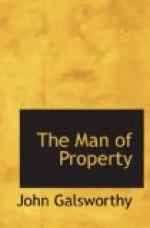His eyes, as he filled that black despatch case, looked as if at any moment they might blaze up with anger. So gleams the eye of a schoolboy, baited by a ring of his companions; but he controls himself, deterred by the fearful odds against him. And old Jolyon controlled himself, keeping down, with his masterful restraint now slowly wearing out, the irritation fostered in him by the conditions of his life.
He had received from his son an unpractical letter, in which by rambling generalities the boy seemed trying to get out of answering a plain question. ‘I’ve seen Bosinney,’ he said; ’he is not a criminal. The more I see of people the more I am convinced that they are never good or bad—merely comic, or pathetic. You probably don’t agree with me!’
Old Jolyon did not; he considered it cynical to so express oneself; he had not yet reached that point of old age when even Forsytes, bereft of those illusions and principles which they have cherished carefully for practical purposes but never believed in, bereft of all corporeal enjoyment, stricken to the very heart by having nothing left to hope for—break through the barriers of reserve and say things they would never have believed themselves capable of saying.
Perhaps he did not believe in ‘goodness’ and ‘badness’ any more than his son; but as he would have said: He didn’t know—couldn’t tell; there might be something in it; and why, by an unnecessary expression of disbelief, deprive yourself of possible advantage?
Accustomed to spend his holidays among the mountains, though (like a true Forsyte) he had never attempted anything too adventurous or too foolhardy, he had been passionately fond of them. And when the wonderful view (mentioned in Baedeker—’fatiguing but repaying’)—was disclosed to him after the effort of the climb, he had doubtless felt the existence of some great, dignified principle crowning the chaotic strivings, the petty precipices, and ironic little dark chasms of life. This was as near to religion, perhaps, as his practical spirit had ever gone.
But it was many years since he had been to the mountains. He had taken June there two seasons running, after his wife died, and had realized bitterly that his walking days were over.
To that old mountain—given confidence in a supreme order of things he had long been a stranger.
He knew himself to be old, yet he felt young; and this troubled him. It troubled and puzzled him, too, to think that he, who had always been so careful, should be father and grandfather to such as seemed born to disaster. He had nothing to say against Jo—who could say anything against the boy, an amiable chap?—but his position was deplorable, and this business of June’s nearly as bad. It seemed like a fatality, and a fatality was one of those things no man of his character could either understand or put up with.
In writing to his son he did not really hope that anything would come of it. Since the ball at Roger’s he had seen too clearly how the land lay—he could put two and two together quicker than most men—and, with the example of his own son before his eyes, knew better than any Forsyte of them all that the pale flame singes men’s wings whether they will or no.




